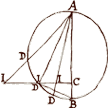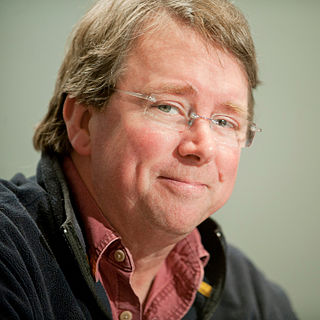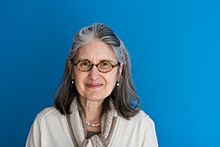
Stephen Jay Greenblatt is an American literary historian and author. He has served as the John Cogan University Professor of the Humanities at Harvard University since 2000. Greenblatt is the general editor of The Norton Shakespeare (2015) and the general editor and a contributor to The Norton Anthology of English Literature.

The Max Planck Institute for the History of Science is a scientific research institute founded in March 1994. It is dedicated to addressing fundamental questions of the history of knowledge from the Neolithic era to the present day, and its researchers pursue a historical epistemology in their study of how new categories of thought, proof, and experience have emerged in interactions between the sciences and their ambient cultures.
Quentin Robert Duthie Skinner is a British intellectual historian. He is regarded as one of the founders of the Cambridge School of the history of political thought. He has won numerous prizes for his work, including the Wolfson History Prize in 1979 and the Balzan Prize in 2006. Between 1996 and 2008 he was Regius Professor of History at the University of Cambridge. He is the Emeritus Professor of the Humanities and Co-director of The Centre for the Study of the History of Political Thought at Queen Mary University of London.

Anthony Thomas Grafton is an American historian of early modern Europe and the Henry Putnam University Professor of History at Princeton University, where he is also the Director the Program in European Cultural Studies. He is also a corresponding fellow of the British Academy and a recipient of the Balzan Prize. From January 2011 to January 2012, he served as the President of the American Historical Association. From 2006 to 2020, Grafton was co-executive editor of the Journal of the History of Ideas.

Peter Louis Galison is an American historian and philosopher of science. He is the Joseph Pellegrino University Professor in history of science and physics at Harvard University.

Hans Joas is a German sociologist and social theorist.
Svetlana Leontief Alpers is an American art historian, also a professor, writer and critic. Her specialty is Dutch Golden Age painting, a field she revolutionized with her 1984 book The Art of Describing. She has also written on Tiepolo, Rubens, Bruegel, and Velázquez, among others.
The Pfizer Award is awarded annually by the History of Science Society "in recognition of an outstanding book dealing with the history of science"

The Berlin-Brandenburg Academy of Sciences and Humanities, abbreviated BBAW, is the official academic society for the natural sciences and humanities for the German states of Berlin and Brandenburg. Housed in three locations in and around Berlin, Germany, the BBAW is the largest non-university humanities research institute in the region.

Hans Belting was a German art historian and media theorist with a focus on image science, and this with regard to contemporary art and to the Italian art of the Middle Ages and the Renaissance.

Raghavendra Gadagkar is an honorary professor at the Centre for Ecological Sciences, Indian Institute of Science in Bangalore, India, who studies evolution of social behaviour using eusocial insects using Ropalidia marginata, a locally common wasp as a model. He was, from 2014 to 2016, the president of the Indian National Science Academy.
Ann M. Blair is an American historian, and the Carl H. Pforzheimer University Professor at Harvard University. She specializes in the cultural and intellectual history of early modern Europe, with an emphasis on France. Her interests include the history of the book and of reading, the history of the disciplines and of scholarship, and the history of interactions between science and religion. She is most widely known for being the author of the bestselling book Too Much to Know: Managing Scholarly Information before the Modern Age (2010). Blair was elected to the American Philosophical Society in 2009.
Katharine Park is a Radcliffe Professor of the History of Science at Harvard University. She specializes in the history of gender, sexuality, and the female body in medieval and Renaissance Europe, as well as categories and practices of experience and observation in the Middle Ages. Park was awarded a Marshall Scholarship in 1974. She received her M.Phil in the Combined Historical Studies of the Renaissance at the Warburg Institute, University of London, and earned a Ph.D. in the History of Science at Harvard in 1981.

Ian Thomas Baldwin is an American ecologist.
Jürgen Renn is a German historian of science, and since 1994 Director at the Max Planck Institute for the History of Science in Berlin.
Dagmar Schäfer is a German sinologist and historian of science. She is director of Department III, Artifacts, Action, Knowledge at the Max Planck Institute for the History of Science, Berlin. She is honorary professor for the history of technology, Technical University, Berlin; adjunct professor, Institute of Sinology, Freie Universität, Berlin, and Tianjin University (2018–2021). She was previously a guest professor at the school of history and culture of science, Shanghai Jiao Tong University. She was also the director of the Centre for Chinese Studies and held the professorial chair of Chinese studies, both at the University of Manchester.
Hans-Jörg Rheinberger is an historian of science who comes from Liechtenstein. He was director of the Max Planck Institute for the History of Science in Berlin from 1997 to 2014. His focus areas within the history of science are the history and epistemology of the experiment, and further the history of molecular biology and protein biosynthesis. Additionally he writes and publicizes essays and poems.
Michael Dan Gordin is an American science historian and Slavist.

Cecelia Watson is an American author, and a historian and philosopher of science.
Hartmut Lehmann is a German historian of modern history who specializes in religious and social history. He is known for his research on Pietism, secularization, religion and nationalism, transatlantic studies and Martin Luther. He was the founding director of the German Historical Institute Washington DC and was a director of the Max Planck Institute for History. He is an emeritus honorary professor at Kiel University and the University of Göttingen.










